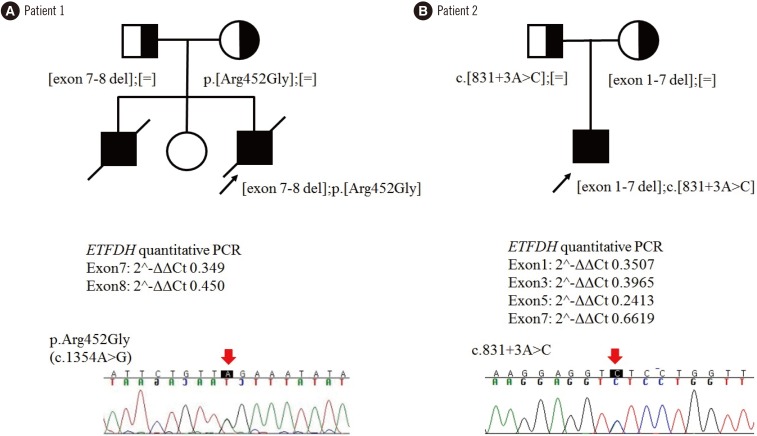Ann Lab Med.
2018 Nov;38(6):616-618. 10.3343/alm.2018.38.6.616.
Clinical Features of Multiple Acyl-CoA Dehydrogenase Deficiency With ETFDH Variants in the First Korean Cases
- Affiliations
-
- 1Department of Pediatrics, Seoul National University College of Medicine, Seoul National University Children's Hospital, Seoul, Korea. jmko@snu.ac.kr
- 2Department of Laboratory Medicine, Seoul National University College of Medicine, Seoul, Korea.
- 3Department of Laboratory Medicine, Yonsei University College of Medicine, Seoul, Korea.
- KMID: 2429132
- DOI: http://doi.org/10.3343/alm.2018.38.6.616
Abstract
- No abstract available.
Figure
Reference
-
1. Przyrembel H, Wendel U, Becker K, Bremer HJ, Bruinvis L, Ketting D, et al. Glutaric aciduria type II: report on a previously undescribed metabolic disorder. Clin Chim Acta. 1976; 66:227–239. PMID: 1245071.2. Lindner M, Hoffmann GF, Matern D. Newborn screening for disorders of fatty-acid oxidation: experience and recommendations from an expert meeting. J Inherit Metab Dis. 2010; 33:521–526. PMID: 20373143.3. Grünert SC. Clinical and genetical heterogeneity of late-onset multiple acyl-coenzyme A dehydrogenase deficiency. Orphanet J Rare Dis. 2014; 9:117. PMID: 25200064.4. Lehnert W, Wendel U, Lindenmaier S, Böhm N. Multiple acyl-CoA dehydrogenation deficiency (glutaric aciduria type II), congenital polycystic kidneys, and symmetric warty dysplasia of the cerebral cortex in two brothers. Eur J Pediatr. 1982; 139:56–59. PMID: 7173259.5. Al-Essa MA, Rashed MS, Bakheet SM, Patay ZJ, Ozand PT. Glutaric aciduria type II: observations in seven patients with neonatal- and late-onset disease. J Perinatol. 2000; 20:120–128. PMID: 10785889.6. Olsen RK, Olpin SE, Andresen BS, Miedzybrodzka ZH, Pourfarzam M, Merinero B, et al. ETFDH mutations as a major cause of riboflavin-responsive multiple acyl-CoA dehydrogenation deficiency. Brain. 2007; 130:2045–2054. PMID: 17584774.7. Chen M, Peng J, Wei W, Wang R, Xu H, Liu H. A novel ETFDH mutation in an adult patient with late-onset riboflavin-responsive multiple acyl-CoA dehydrogenase deficiency. Int J Neurosci. 2018; 128:291–294. PMID: 28914566.8. Yotsumoto Y, Hasegawa Y, Fukuda S, Kobayashi H, Endo M, Fukao T, et al. Clinical and molecular investigations of Japanese cases of glutaric acidemia type 2. Mol Genet Metab. 2008; 94:61–67. PMID: 18289905.9. Livak KJ, Schmittgen TD. Analysis of relative gene expression data using real-time quantitative PCR and the 2(-Delta Delta C(T)) method. Methods. 2001; 25:402–408. PMID: 11846609.10. Richards S, Aziz N, Bale S, Bick D, Das S, Gastier-Foster J, et al. Standards and guidelines for the interpretation of sequence variants: a joint consensus recommendation of the American College of Medical Genetics and Genomics and the Association for Molecular Pathology. Genet Med. 2015; 17:405–424. PMID: 25741868.
- Full Text Links
- Actions
-
Cited
- CITED
-
- Close
- Share
- Similar articles
-
- Multiple Acyl-CoA Dehydrogenase Deficiency: Phenotypic and Genetic Features of a Malaysian Cohort
- A Suspect Case of Medium Chanin Acyl-Coenzyme A Dehydrogenase Deficiency with Iron Deficiency Anemia
- Organic acidemias in Korea
- Compound heterozygous mutations of ACADS gene in newborn with short chain acyl-CoA dehydrogenase deficiency: case report and literatures review
- Late-Onset Myopathic form of Very-Long-Chain Acyl-CoA Dehydrogenase Deficiency Linked to Compound Heterozygous Variants in ACADVL


